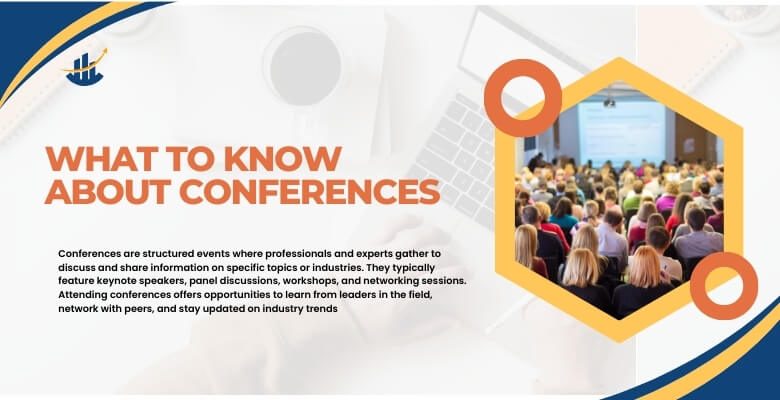When planning to attend or organize a conference, it’s essential to understand the goals you aim to achieve. Conferences serve as a platform for networking, knowledge sharing, and professional development, but what are common conference objectives?
Key conference objectives include expanding knowledge, building professional relationships, and generating leads. These goals enable attendees to gain valuable insights, connect with industry peers, and create opportunities for business growth and collaboration.
Take a look into the rest of this article to discover more about the primary goals of attending conferences and how they can benefit you professionally and personally.
What to Know About Conferences?
Conferences serve as key gatherings that bring together professionals from various fields to share ideas, acquire knowledge, and foster relationships. They provide invaluable opportunities for networking, gaining insights, and staying informed about industry trends. The objectives of international conferences typically emphasize promoting collaboration and facilitating knowledge exchange among global professionals. Attendees can also engage in workshops, panel discussions, and keynote presentations led by industry experts.
Planning for a conference requires choosing relevant sessions and setting clear personal goals. Make sure to allocate time for networking and informal discussions to maximize the experience. Whether online or in person, conferences help broaden perspectives and open doors to new opportunities. The key is to stay engaged, take notes, and follow up with contacts after the event.
What Are Common Conference Objectives?
Conferences are more than just meetings; they serve multiple purposes, each vital for personal and professional growth. Whether you are an attendee, speaker, or sponsor, understanding the common objectives will help you get the most out of the experience. Let’s explore these key objectives and see how they contribute to a successful conference.
Networking: Building Connections That Matter
One major conference goal is connecting people with shared interests and professional goals. Networking allows attendees to meet new colleagues, collaborators, or potential mentors. These relationships can open doors to future opportunities and long-term partnerships, making conferences a valuable space for professional growth.
Conferences are designed to create these meaningful connections in both formal and informal settings. From coffee breaks to structured networking sessions, there’s always a chance to meet someone valuable. In today’s interconnected world, international conferences bring together experts from different countries, creating a dynamic space for knowledge-sharing. One prime example is conferences in Canada, which attract professionals from diverse industries, providing even more opportunities to expand networks and build strong connections.
Knowledge Sharing: Spreading Ideas and Insights
A key objective is to share knowledge, including the latest research, innovations, and best practices. Presenters bring fresh ideas and research findings that can help advance the field. Participants leave with new strategies, techniques, and approaches to apply in their work.
Workshops, panels, and presentations all focus on providing valuable content in an engaging format. Attendees can learn from leading experts and ask questions in real-time. This knowledge-sharing benefits everyone, from new professionals to seasoned experts.
Skill Development: Enhancing Competencies
Skill-building sessions are essential to many conferences, helping attendees improve their expertise. Workshops, training sessions, and tutorials offer hands-on learning experiences. Participants can gain practical knowledge that they can immediately apply in their careers.
These sessions focus on enhancing specific skills, from technical competencies to soft skills like communication. With expert instructors and real-world examples, these sessions ensure attendees can grow professionally. Conference organizers prioritize skill development to make the experience beneficial for all participants.
Innovation and Inspiration: Sparking New Ideas
Many conferences aim to inspire attendees by showcasing the latest innovations and creative ideas. From breakthrough technologies to revolutionary methodologies, conferences are platforms for future-thinking. Exposure to fresh ideas can encourage attendees to implement innovative changes in their work.
The presentation of new innovations often drives conversations and sparks creative discussions. It’s a time for attendees to think outside the box and explore cutting-edge trends. Inspiration from these events often leads to progress and exciting developments within industries.
Brand Awareness: Showcasing Products and Services
For companies, conferences offer a great platform to promote their brand, products, and services. Exhibitors can showcase their offerings to a targeted, interested audience. This not only helps in sales but also boosts brand recognition and awareness.
Companies often sponsor conferences or set up booths to engage directly with potential customers. In these settings, businesses can communicate their unique selling points and build lasting brand impressions. It’s an ideal opportunity for businesses to connect with a highly relevant audience.
Industry Trends: Keeping Pace With the Future
Conferences are also valuable for highlighting and discussing industry trends and future directions. Sessions often focus on what’s coming next in technology, policy, and practices. Attendees leave with a better understanding of where their industry is headed.
This forward-looking perspective helps professionals stay ahead in a rapidly changing world. By staying informed on these trends, attendees can adapt and grow their businesses or careers. Conferences keep professionals informed and equipped to handle future challenges and opportunities.
Problem-Solving: Finding Solutions Together
Another common objective is tackling industry challenges and finding collective solutions through expert discussions. Panel discussions and brainstorming sessions encourage collaborative problem-solving. These moments of insight can lead to breakthroughs in addressing pressing challenges.
Attendees can engage with experts who bring unique perspectives on common issues. Together, they can explore solutions that benefit the entire industry. This collaborative approach ensures that the event isn’t just about learning but also about finding actionable outcomes.
How Do Conference Objectives Impact Attendees?
Taking part in conferences can have a profound impact on an individual’s personal and professional growth. Each conference has clear objectives that shape attendees’ experiences in various ways. Understanding how these goals influence participants can help maximize the benefits. Let’s dive into some of the ways these objectives impact conference attendees.
Building Stronger Networks
One major impact on attendees is the chance to build a wide network of professional contacts. Conferences bring together individuals from different sectors, creating opportunities for future collaborations. These connections often lead to lasting relationships that support career advancement. Networking sessions give attendees a chance to meet peers and industry leaders.
Gaining New Knowledge and Insights
Conferences provide valuable learning experiences that impact how attendees approach their work. Presentations and discussions offer new perspectives and solutions to industry challenges. This knowledge can directly improve the way professionals execute their roles. Attendees often leave inspired by the fresh ideas they’ve encountered.
Enhancing Professional Skills
Attendees benefit from sessions that focus on developing both technical and soft skills. Training and workshops help them improve in areas critical to their professional growth. These interactive sessions provide hands-on experiences, making learning more effective. Improved skills often lead to better job performance and career advancement.
Exposure to Innovation and Trends
Conference attendees gain insight into the latest trends and innovations in their industry. This exposure helps them stay ahead and adapt to emerging changes. Understanding what makes successful conference features allows attendees to engage with groundbreaking ideas. It’s an opportunity to learn about future directions that shape their industries.
Problem-Solving with Peers
Conferences offer attendees the chance to address challenges by collaborating with others in the field. Group discussions and panels provide multiple viewpoints on industry-specific problems. This collective problem-solving approach sparks new ideas and potential solutions. Attendees leave with actionable insights that improve their work.
How to Prepare for Attending a Conference?
Preparing for a conference involves several essential steps to ensure a smooth and productive experience. Follow this guide to make the most of your upcoming event.
Step 1: Visit the Conference Organizer’s Website
Begin by visiting the conference organizer’s website to gather essential information. Review the event details, agenda, and keynote speakers to ensure the conference aligns with your professional interests.
Step 2: Find Your Field-Related Conference
Search for conferences relevant to your field. Use filters to narrow down options based on location, dates, and topics. This ensures you attend a conference that offers valuable insights and networking opportunities.
Step 3: Complete the Registration
Register for the conference through the organizer’s website. Pay attention to the cost of conference registration, ensuring it fits within your budget. Complete the registration process accurately to avoid any issues.
Step 4: Receive the Invitation Letter
After completing the registration, you will receive an invitation letter from the conference organizers. This letter is crucial for visa applications and may also include additional event details.
Step 5: Apply for a Visa
Use the invitation letter to apply for a visa. Ensure you have all the necessary documents and meet the application requirements. Submit your application well in advance to avoid last-minute delays.
Step 6: Plan Accommodation and Travel
Once your visa is approved, plan your accommodation and travel. Book a hotel close to the conference venue for convenience. Arrange your travel itinerary, considering any potential delays or layovers.
Tips to Maximize the Conference Experience
The opportunity to learn, grow, and connect can be exciting when you attend a conference. To get the most out of the experience, it’s essential to plan and engage thoughtfully. Here are some practical tips to help you make the most of any conference.
- Set clear goals before attending. Decide what you want to achieve, whether it’s networking, learning new skills, or exploring industry trends. understanding the main purpose of the conference can help you set a clear goal.
- Plan your schedule ahead of time. Review the agenda and choose sessions that align with your professional goals and personal interests.
- Engage actively during sessions. Ask questions, participate in discussions, and take notes to ensure you absorb key takeaways from presentations.
- Make time for networking. Use breaks and social events to introduce yourself to new people and foster valuable professional connections.
- Follow up with new contacts after the event. Send emails or connect on social media to maintain relationships and keep the conversation going.
- Attend workshops or training sessions. Take advantage of hands-on learning opportunities that can help you develop new skills or refine existing ones.
- Stay open to new ideas and perspectives. Conferences expose you to fresh concepts, so remain open-minded and willing to explore new approaches.
- Maximizing your conference experience takes planning and active participation. By setting goals and engaging fully, you can leave the event with lasting value.
Frequently Asked Questions About What Are Common Conference Objectives?
Attendees can maximize their experience and achieve their professional goals by understanding the common objectives of conferences. Here are some frequently asked questions and their detailed answers to provide a deeper insight into conference objectives.
Why Are Conference Objectives Important?
Conference objectives are important because they provide a clear framework for the event. They help organizers plan effectively and ensure that all activities align with the intended goals, improving the overall experience.
How Do Conference Objectives Increase Learning?
Conference objectives increase learning by focusing sessions and workshops on key topics. This ensures attendees gain valuable insights and skills that are relevant to their field, improving their professional competence.
How Do Conference Objectives Support Professional Development?
Conference objectives support professional development by offering sessions on skill-building and career advancement. These objectives ensure that attendees have access to resources and knowledge that can help them grow professionally.
How Do Conference Objectives Promote Collaboration?
Conference objectives promote collaboration by creating opportunities for attendees to work together. Workshops and breakout sessions are designed to encourage discussions and joint projects, raising a collaborative environment.
How Do Conference Objectives Measure Success?
Conference objectives measure success by providing benchmarks for evaluating the event. Attendees can assess their experiences against these goals to determine if the conference met their expectations and provided value.
How Do Conference Objectives Impact Feedback and Future Events?
Conference objectives impact feedback by guiding attendees on what to focus on when providing their input. Understanding these objectives helps organizers collect targeted feedback to improve future events and better meet attendees’ needs.
Last Words
Getting the most out of a conference requires careful preparation and an understanding of its objectives. From registering and planning travel to understanding the goals, each step ensures a productive and enriching experience. Preparing well in advance allows you to focus on learning, networking, and collaborating effectively.
The purpose of conferences is to increase knowledge, build relationships, and generate leads. You can maximize opportunities by aligning your personal goals with these objectives. Remember, “What are common conference objectives?” Not just a question to ponder but a guide to improving your professional journey.
You can gain insight, network with peers, or explore new business opportunities by understanding and preparing for conference objectives. Plan meticulously, engage actively, and take full advantage of what the conference offers to achieve your professional and personal growth goals.








